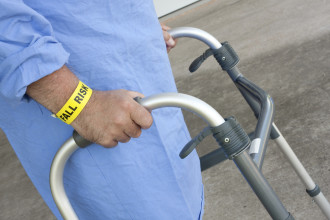Just 12 percent of Georgia home health agencies received a superior 4-star or 5-star rating in a new Medicare quality ranking system for that industry.
The only states worse than Georgia in percentage of top-rated home health agencies were Alaska, with 0 percent, Washington state, with 3 percent, Wyoming, with 4 percent, and Oregon, with 9 percent.
Most Georgia home health agencies (63 percent) received a 3-star or 3.5-star rating, while 25 percent got 2.5 stars or lower, according to a Kaiser Health News analysis.
The rankings for home health agencies, released last week, are the latest quality-based star ratings of medical providers from Medicare.
Such measures help provide more transparency for consumers to assess the care delivered by an organization.
Nationwide, millions of Medicare beneficiaries receive home health services every year.
These services are usually less expensive, more convenient, and just as effective as care that a patient gets in a hospital or nursing home, federal officials say. Examples of home services include wound care for pressure sores or a surgical wound; intravenous or nutrition therapy; and monitoring serious illness and able health status.
“Adding star ratings to Home Health Compare is another step forward in our continuing efforts to empower consumers by providing more information to help them make health care decisions, while also encouraging providers to strive for higher levels of quality,” Dr. Patrick Conway, acting principal deputy administrator for the federal Centers for Medicare and Medicaid Services, said in a statement.
A third or more of home health agencies that Medicare rated received four or more stars in Alabama, California, Florida, Maryland, New Jersey, Pennsylvania, Rhode Island, South Dakota and Utah, the Kaiser Health News analysis found.
Two Georgia home health organizations earned 5 stars: Gordon Home Care in Calhoun, and Taylor Home Health Care in Hawkinsville.
The highest proportion of 1 or 2 star agencies were in Alaska, Arkansas, Minnesota, Ohio, Oregon, Texas, Wyoming, and the District of Columbia, Kaiser Health News reported.
No agency in Georgia received a 1 star or 1.5 star, according to the KHN analysis.
The agencies were evaluated on nine measures, which are how often:
** The agency began their patients’ care in a timely manner
** The agency made sure their patients received a flu shot
** The agency taught patients or their caregivers about their prescribed drugs
** The patients got better at walking or moving around
** The patients got better at getting in and out of bed
** The patients had less pain when moving around
** The patients got better at bathing
** The patients’ breathing improved
** The patients had to be admitted to the hospital
Patients and caregivers often don’t have much information about home health care when it’s needed.
“It’s not like a nursing home, where you can go and walk around,” Dr. Cheryl Phillips, an executive at LeadingAge, an association of nonprofit groups focused on the elderly, told Kaiser Health News. “You can call the agencies and find out a little bit about them and their philosophy of care, but even for an informed consumer like me, you’re kind of stuck with whatever your physician has ordered.”
Experts said the ratings could have substantial financial impacts on agencies, even driving some low-rated ones out of business, KHN’s Jordan Rau reported.
“It’s a very fragmented, competitive market in a lot of metropolitan areas,” said Lilly Hummel, a manager at Avalere, a consulting firm in Washington, D.C. “It could get difficult for home health agencies that, for whatever reason, aren’t doing well on the star ratings.”
And the use of a star rating system can be confusing. The public, familiar with commercial rankings for restaurants, hotels, etc., often sees a rating of three stars as mediocre. But the government system uses three stars to indicate a solid performer, KHN reported.
“It kind of equates us to a hotel and it’s not the same,” Carrie Koenig, an executive at MedStar Visiting Nurse Association, which serves people in Maryland, Virginia and Washington and received 3½ stars, told KHN. “I don’t know how confusing that will be for consumers.”
Many of the quality results are reported by home health agencies themselves. “Down the line, we are absolutely going to have to find another data source,” said Molly Smith, an executive at the Visiting Nurse Associations of America. “It really undermines the home health industry to always be reporting with data that has, yes, the potential to be manipulated.”
Star ratings are also publicly displayed by Medicare on Nursing Home Compare, Physician Compare, Dialysis Facility Compare, the Medicare Advantage Plan Finder, and Hospital Compare.



